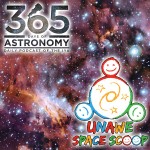Podcaster: Richard Drumm
 Title: Space Scoop: Learning From The Stars: Cosmic Recycling
Title: Space Scoop: Learning From The Stars: Cosmic Recycling
Organization: 365 Days Of Astronomy
Link : astrosphere.org ; http://unawe.org/kids/unawe1538/
Description: Space scoop, news for children.
Bio: Richard Drumm is President of the Charlottesville Astronomical Society and President of 3D – Drumm Digital Design, a video production company with clients such as Kodak, Xerox and GlaxoSmithKline Pharmaceuticals. He was an observer with the UVa Parallax Program at McCormick Observatory in 1981 & 1982. He has found that his greatest passion in life is public outreach astronomy and he pursues it at every opportunity.
Today’s sponsor: This episode of “365 Days of Astronomy” is sponsored by — no one. We still need sponsors for many days in 2015, so please consider sponsoring a day or two. Just click on the “Donate” button on the lower left side of this webpage, or contact us at signup@365daysofastronomy.org.
Transcript:
This is 365 Days of Astronomy. Today we bring you a new episode in our Space Scoop series. This show is produced in collaboration with Universe Awareness, a program that strives to inspire every child with our wonderful cosmos.
Today’s story is…Learning From The Stars: Cosmic Recycling
If you throw a plastic bottle in the trash bin today, that bottle will sit in a landfill, or float in the ocean, for hundreds of years.
No one knows what Earth will be like in hundreds of years from now. But we know that that plastic bottle will still be a plastic bottle!
What can we do to stop this from happening?
We can follow the example of the Universe, and recycle! In the very beginning, before the Sun, the Earth and the rest of our Solar System existed, the first stars, in their nuclear furnace cores began fusing hydrogen gas and creating helium. Then they fused helium to make carbon and oxygen and other elements.
Like humans, stars are born, live and eventually die, so to speak. Whether they die in dramatic supernova explosions or simply by losing control of their atmosphere’s outer layers, the newly made elements in them are splattered across the cosmos.
The astro-image used in today’s album artwork shows a gigantic region of space called a nebula. Specifically it’s The Prawn Nebula. It’s also called Gum 56 after the Australian astronomer Colin Stanley Gum who catalogued ionized hydrogen gas clouds in 1955.
It’s ALSO called IC 4628 as it’s in the so-called Index Catalog, which you might remember from my last UNAWE podcast back on the 11th of this month.
This fine example of HII gas cloud is located in the constellation of Scorpius, which is on the southern horizon just after dark this time of year.
For millions of years new stars have been born out of the gas in this nebula. And for millions of years these stars have died and returned the gas to the nebula so the circle could begin again.
Without this cosmic recycling, the Sun and planets of our Solar System would not exist.
Recycling has played an important role in helping life to literally bloom on Earth. And if we want life to continue flourishing on our planet, we need to make recycling an important role in our daily lives, too.
Hey, here’s a Cool Fact:
Recycling doesn’t have to be hard work; in fact it can be fun! Why not make your own jewelry stand, cat-themed pots for plants or a pretend jet pack for a Halloween costume – all from recycled plastic bottles! Go to http://www.boredpanda.com/plastic-bottle-recycling-ideas/ to find out how!
Thank you for listening to 365 Days of Astronomy!
End of podcast:
365 Days of Astronomy
=====================
The 365 Days of Astronomy Podcast is produced by NUCLIO. Audio post-production by Richard Drumm. Bandwidth donated by libsyn.com and wizzard media. You may reproduce and distribute this audio for non-commercial purposes. Please consider supporting the podcast with a few dollars (or Euros!). Visit us on the web at 365DaysOfAstronomy.org or email us at info@365DaysOfAstronomy.org. This year we celebrate cosmic light as light is our info messenger in the universe. Join us and share your story to celebrate the International Year of Light. Until tomorrow! Goodbye!

